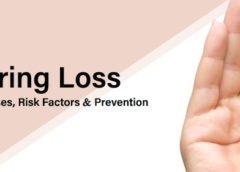Hearing loss is the impaired hearing capacity. Deafness is the utter powerlessness of hearing speech. The causes of deafness and hearing loss are numerous and can occur at any age. People can suddenly go deaf as a complication of a virus, or lose their hearing over time due to disease, nerve damage, or noise-induced injury. Around three in 1,000 babies are born deaf, mostly due to genetic factors. Around 2 out of every 10 people in Canada have at least a moderate hearing loss and about half of Canadians over the age of 60 have hearing loss.
Symptoms
They also ask people to repeat themselves: When they hear “what?” Your hearing could be failing all the time, so you need to look at somebody to hear what they’re saying (also reading their lips).
You turn the television to a volume others find loud: it’s time to get a hearing test if you can’t have a conversation because the television is too noisy.
You have difficulty following conversations in noisy places: This is one of the first problems people face with hearing loss: knowing what someone else is doing in a noise-filled restaurant.
You have trouble hearing the voices of women and children: High-frequency hearing loss is very common — so it’s to be expected that the voices of women and children would be hard to hear.
You have trouble listening on the phone: When you have trouble sometime, that’s OK. When you feel regularly like you can’t hear on the call, whether you use a landline or a cell phone, this could be a symptom of hearing loss.
You avoid social interactions that once were pleasant: people who are not able to communicate easily feel left out of conversations, or who have bad experiences trying to hear in public spaces often decide it’s easier to decline invitations and stay at home. It doesn’t have to be this way.
Others tell you that you have a hearing loss: If more than one friend or family member asks your hearing acuity — in seriousness or jest — what do you guess? They might be on to something.
Causes
The causes of hearing loss and deafness can be inherited or congenital.
Congenital causes
Congenital causes can lead to hearing loss at or acquired shortly after birth. Hearing loss can be caused by genetic factors inherited and non-hereditary or by certain complications during pregnancy and childbirth, including:
- Low birth weight;
- Asphyxia from birth (a lack of oxygen at birth);
- Maternal rubella, syphilis, or any other pregnancy infections
Acquired causes
The causes acquired may lead to hearing loss at any age, for example:
- Infectious diseases including meningitis, measles and mumps;
- Chronic ear infections;
- Ear fluid collection (otitis media);
- Use of other medications, such as those used to treat neonatal diseases, malaria, drug-resistant tuberculosis and cancers
- Head injury or an ear injury
- Excessive noise, including the noise from machinery and explosions at work
- Ageing, especially due to sensory cell degeneration; and
- Ear canal blocking wax or foreign bodies;
Risk factors
Factors which can damage or cause hair loss and nerve cells loss in your inner ear include:
Aging: Degeneration of inner ear structures occurs over time.
Loud Noise: Exposure to noisy noises can damage your inner ear cells. Damage can occur with long-term exposure to loud noises, or from a brief noise blast, such as a gunshot.
Heredity: Your genetic makeup will make you more susceptible to ear damage caused by voice or ageing degradation.
Medications: Drugs like gentamicin antibiotics, sildenafil (Viagra) and other chemotherapy drugs can harm the inner ear. Temporary effects on your hearing — ear ringing (tinnitus) or hearing loss — can occur if you are taking extremely large doses of aspirin, other pain relievers, antimalarial medications, or diuretics throughout the loop.
Illnesses: The cochlea can be damaged by diseases or illnesses that result in high fever, such as meningitis.
Complications
Hearing loss has been shown to harm the quality of life and mental health of individuals. When you’re having hearing loss, you might have trouble understanding others. This can increase your level of anxiety, or trigger depression. Treatment for hearing loss will greatly change your life. You will regain trust in yourself, while also strengthening your ability to communicate with others.
Prevention
Nothing can prevent problems of hearing that arise from birth or hearing impairment due to illness or accident.
Some steps can, however, be taken to reduce the risk of losing any of your sense of hearing.
The structures in the ears can be damaged in several different ways. Long-term noise exposure above 85 dB – the frequency of a standard lawnmower – will potentially result in hearing loss.
The following measures may help protect your hearing:
- TV, radio, music players, and toys: Do not set too large a volume. The children are highly sensitive to the adverse effects of loud music. Noisy toys can endanger hearing for children.
- Headphones: Concentrate on isolating the sounds you want to hear and removing as much sound from the world as possible, rather than filtering it out with high volume.
- Occupational health: If you work in noisy surroundings like discotheques, nightclubs and pubs, wear earplugs or earmuffs.
- Leisure venues: If you go to pop concerts, motor racing, drag racing, and other noisy events, wear earplugs.
- Cotton swabs: Don’t poke them into ears of adults or babies. The same applies to the tissues or Q-tips.
Hearing can often deteriorate with age, but taking the correct preventive measure early on can reduce the risk.

Leave a Reply
You must be logged in to post a comment.